反意疑问句
反义疑问句及后置定语
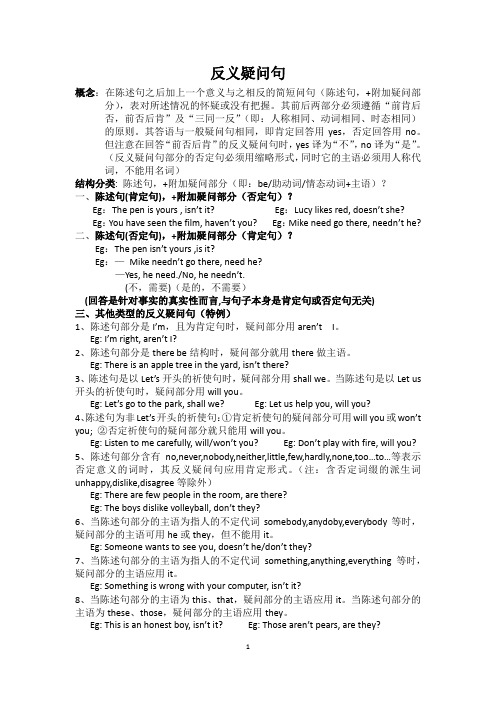
反义疑问句概念:在陈述句之后加上一个意义与之相反的简短问句(陈述句,+附加疑问部分),表对所述情况的怀疑或没有把握。
其前后两部分必须遵循“前肯后否,前否后肯”及“三同一反”(即:人称相同、动词相同、时态相同)的原则。
其答语与一般疑问句相同,即肯定回答用yes,否定回答用no。
但注意在回答“前否后肯”的反义疑问句时,yes译为“不”,no译为“是”。
(反义疑问句部分的否定句必须用缩略形式,同时它的主语必须用人称代词,不能用名词)结构分类: 陈述句,+附加疑问部分(即:be/助动词/情态动词+主语)?一、陈述句(肯定句),+附加疑问部分(否定句)?Eg:The pen is yours ,isn’t it?Eg:Lucy likes red, doesn’t she?Eg:You have seen the film, haven’t you?Eg:Mike need go there, needn’t he? 二、陈述句(否定句),+附加疑问部分(肯定句)?Eg:The pen isn’t yours ,is it?Eg:—Mike needn’t go there, need he?—Yes, he need./No, he needn’t.(不,需要)(是的,不需要)(回答是针对事实的真实性而言,与句子本身是肯定句或否定句无关)三、其他类型的反义疑问句(特例)1、陈述句部分是I’m,且为肯定句时,疑问部分用aren’t I。
Eg: I’m right, aren’t I?2、陈述句部分是there be结构时,疑问部分就用there做主语。
Eg: There is an apple tree in the yard, isn’t there?3、陈述句是以Let’s开头的祈使句时,疑问部分用shall we。
当陈述句是以Let us 开头的祈使句时,疑问部分用will you。
Eg: Let’s go to the park, shall we? Eg: Let us help you, will you?4、陈述句为非Let’s开头的祈使句:①肯定祈使句的疑问部分可用will you或won’t you; ②否定祈使句的疑问部分就只能用will you。
汉语反义疑问句

汉语反义疑问句
1. 汉语反义疑问句可有意思啦,就像一场语言的小冒险!比如说,“你今天没吃饭,对吧?”,这不是很有趣嘛!
2. 汉语反义疑问句啊,那简直是日常交流中的小精灵!像“这电影好看,不是吗?”,多自然的表达呀!
3. 哇哦,汉语反义疑问句,不就是让对话变得更生动的魔法嘛!“你会来参加聚会,对不对?”,是不是感觉很亲切呢!
4. 汉语反义疑问句,那可是能瞬间拉近人与人距离的法宝呀!“他挺厉害的,是不是呀?”,这样一说就感觉亲近多了。
5. 嘿,汉语反义疑问句,就如同给语言加点调料!“这件衣服很适合你,对吧?”,多有意思呀。
6. 汉语反义疑问句,简直是让话语活起来的妙招!“你知道答案的,不是吗?”,能引发好多互动呢。
7. 哎呀呀,汉语反义疑问句,那是让聊天更精彩的秘诀!“她唱歌好听,对不对?”,让人很有聊下去的欲望呢。
8. 汉语反义疑问句,不就是话语中的小惊喜嘛!“你已经准备好了,对吧?”,让交流充满期待。
9. 哇,汉语反义疑问句,这可是让表达更丰富的好东西!“那地方不远,不是吗?”,简单又好用。
10. 汉语反义疑问句,绝对是语言世界里的好玩意儿!“你不会忘了我,对吧?”,让人心里暖暖的。
我的观点结论:汉语反义疑问句在日常交流中有着独特的魅力和重要的作用,它能让对话更丰富、更有趣、更有情感。
反义疑问句
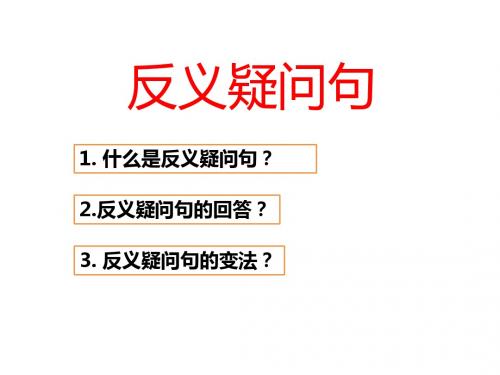
( )4.---This bus is always late, _________? ---Sure, it is. A. is not it B. isn’t it C. isn’t the bus D. doesn’t it ( )5.---You’re new here, ________? ----Yes, I’m from Dujiangyan. I came here last week. A. do you B. don’t you C. are you D. aren’t you ( )6. You used to be outgoing, ? A. do you B. don’t you C. didn’t you D. did you ( )7. He has never watched such an important match , _____ he? A. hasn't B. has C. is D. isn't ( )8.They have to work at once,______ they? A. have B. haven't C. do D. don't ( )9. She often feels tired,______ she? A. doesn't B. does C. is D. isn't ( )10. Let's take a short rest, ______? A. do we B. aren't we C. will you D. shall we ( )11. Hundreds of people lost their lives in the accident, ____they? A. don't B. didn't C. do D. did
反义疑问句
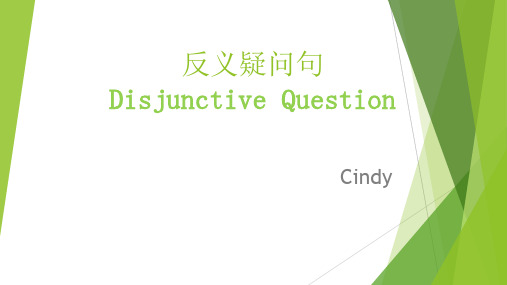
3.Clever girls need never work hard,
B?
A. needn’t they B.need they C.don’t they D.do they
反义疑问句填空。
1.You’d better have a good rest, hadn’t you
ቤተ መጻሕፍቲ ባይዱ
?
2.They have to go there,
(5)陈述部分有“have to/had to+v.”,疑问部分常用“don't/didn't +主语”。 如:We have to get there at eight tomorrow, don't we? (6)陈述部分的谓语是used to时,疑问部分用“didn't/usedn't+主语”。 如:He used to take pictures there, didn't/usedn't he? (7)陈述部分有“had better+v.”,疑问部分用“hadn't+主语”。 如:You'd better read it by yourself,hadn't you? (8)陈述部分有“would rather+v.”,疑问部分用“wouldn't+主语”。 如:He would rather read it ten times than recite it, wouldn't he?
反义疑问句讲解及答案
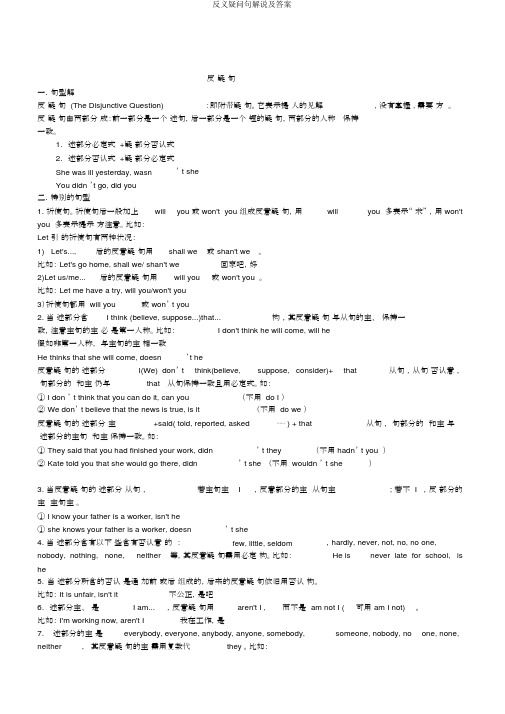
反疑句一.句型解反疑句 (The Disjunctive Question):即附带疑句。
它表示提人的见解, 没有掌握 , 需要方。
反疑句由两部分成:前一部分是一个述句,后一部分是一个短的疑句,两部分的人称保持一致。
1.述部分必定式 +疑部分否认式2.述部分否认式 +疑部分必定式She was ill yesterday, wasn’ t sheYou didn ’t go, did you二.特别的句型1. 祈使句。
祈使句后一般加上will you 或 won't you 组成反意疑句,用will you 多表示“ 求” ,用 won't you 多表示提示方注意。
比如:Let 引的祈使句有两种状况:1) Let's...,后的反意疑句用shall we或 shan't we。
比如: Let's go home, shall we/ shan't we回家吧,好2)Let us/me...后的反意疑句用will you或 won't you 。
比如: Let me have a try, will you/won't you3)祈使句都用 will you或 won’ t you2. 当述部分含I think (believe, suppose...)that...构,其反意疑句与从句的主、保持一致,注意主句的主必是第一人称。
比如:I don't think he will come, will he假如非第一人称,与主句的主相一致He thinks that she will come, doesn’t he反意疑句的述部分I(We) don’ t think(believe,suppose,consider)+that从句,从句否认意,句部分的和主仍与that从句保持一致且用必定式。
如:① I don ’ t think that you can do it, can you(不用 do I )② We don’ t believe that the news is true, is it(不用 do we )反意疑句的述部分主+said( told, reported, asked⋯⋯ ) + that从句,句部分的和主与述部分的主句和主保持一致。
反义疑问句
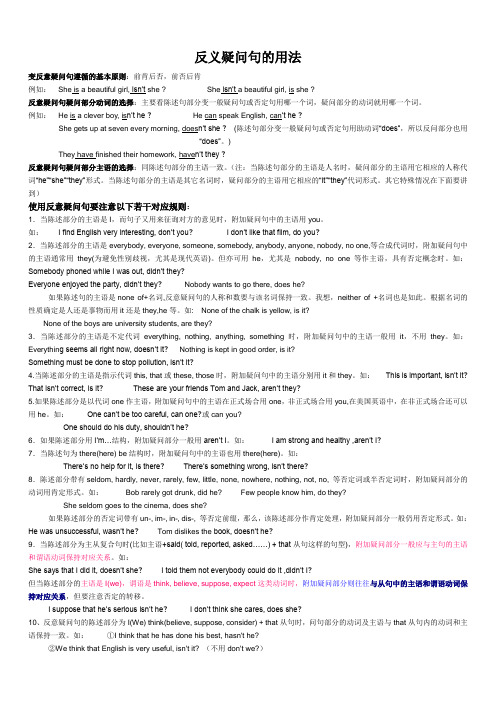
反义疑问句的用法变反意疑问句遵循的基本原则:前肯后否,前否后肯例如:She is a beautiful girl, isn’t she ? She isn’t a beautiful girl, is she ?反意疑问句疑问部分动词的选择:主要看陈述句部分变一般疑问句或否定句用哪一个词,疑问部分的动词就用哪一个词。
例如:He is a clever boy, is n’t he ?He can speak English, can’t he ?She gets up at seven every morning, does n’t she ? (陈述句部分变一般疑问句或否定句用助动词“does”,所以反问部分也用“does”。
)They have finished their homework, have n’t they ?反意疑问句疑问部分主语的选择:同陈述句部分的主语一致。
(注:当陈述句部分的主语是人名时,疑问部分的主语用它相应的人称代词“he”“she”“they”形式。
当陈述句部分的主语是其它名词时,疑问部分的主语用它相应的“it”“they”代词形式。
其它特殊情况在下面要讲到)使用反意疑问句要注意以下若干对应规则:1.当陈述部分的主语是I,而句子又用来征询对方的意见时,附加疑问句中的主语用you。
如:I find English very interesting, don’t you? I don’t like that film, do you?2.当陈述部分的主语是everybody, everyone, someone, somebody, anybody, anyone, nobody, no one,等合成代词时,附加疑问句中的主语通常用they(为避免性别歧视,尤其是现代英语)。
但亦可用he,尤其是nobody, no one等作主语,具有否定概念时。
如:Somebody phoned while I was out, didn’t they?Everyone enjoyed the party, didn’t they? Nobody wants to go there, does he?如果陈述句的主语是none of+名词,反意疑问句的人称和数要与该名词保持一致。
什么是反意疑问句
什么是反意疑问句?反意疑问句(Tag Questions)是一种特殊的疑问句形式,用于在陈述句后面提出一个疑问,以征求对方的确认或否定。
反意疑问句通常由一个陈述句和一个疑问短语组成,疑问短语是一个与陈述句的情态动词、助动词或be 动词形式相一致的疑问词或疑问词组。
反意疑问句有两种类型:肯定反意疑问句和否定反意疑问句。
1. 肯定反意疑问句(Positive Tag Questions)肯定反意疑问句用于在陈述句后面提出一个与陈述句相反的疑问。
当陈述句是肯定形式时,反意疑问句的疑问部分通常是否定形式。
反之,当陈述句是否定形式时,反意疑问句的疑问部分通常是肯定形式。
例如:- You don't like coffee, do you?(你不喜欢咖啡,对吗?)- He is a doctor, isn't he?(他是医生,对吗?)2. 否定反意疑问句(Negative Tag Questions)否定反意疑问句用于在陈述句后面提出一个与陈述句相反的疑问。
当陈述句是肯定形式时,反意疑问句的疑问部分通常是肯定形式。
反之,当陈述句是否定形式时,反意疑问句的疑问部分通常是否定形式。
例如:- You like ice cream, don't you?(你喜欢冰淇淋,对吗?)- He isn't coming, is he?(他不来了,对吗?)需要注意的是,反意疑问句的语调通常是上扬的,以表示疑问的意义。
同时,反意疑问句的疑问部分的动词形式通常与陈述句的主语一致,并且与陈述句的情态动词、助动词或be 动词形式相反。
反意疑问句的使用可以加强与对话者之间的交流,并征求对方的确认或否定。
常用反义疑问句
(1)everyone,no one,nobody ,everybody, anybody, anyone, somebody, someone, nobody, none, neither 时等时,后面的疑问句应表示为:Everyone is in the classroom, aren't they? (基本不用单数,但也可用he)Nobody will go, will they?(2)everything,anything,nothing,something时,附加疑问句中主语一般用it 不用they(3)this,that,或those,these时,附加疑问句中主语用it和they.A当陈述部分有never,seldom, hardly,few,little,barely, scarcely, nothing, little, not, no, no one, nobody, nothing, none, neither 等否定意义的词时,后面的反意疑问句则为肯定形式:There are few apples in the basket, are there?He can hardly swim, can he?They seldom come late, do they?B当陈述部分含有否定意思的词是unhappy,dislike,unfriendly等含有否定词缀的派生词,也就是有un-前缀、-less后缀等含有词缀而意思否定的词,当做肯定句处理,疑问部分要用否定形式。
如:He looks unhappy,doesn't he?他看上去不高兴,不是吗?The girl dislikes history,doesn't she?这女孩不喜欢历史,不是吗?表示主语主观意愿的词含有think, believe, suppose, imagine, expect等动词后接宾语从句构成的主从复合句在构成反意疑问句时,视情况不同有两种不同的构成方式。
反义疑问句
反义疑问句(一)定义由陈述句加简短附加问句构成,用以要求对方证实所述之事。
也称附加疑问句。
1.当陈述部分的主语是I,而句子又用来征询对方的意见时,附加疑问句中的主语用you。
如:I find English very interesting, don’t you?I don’t like that film, do you?2.如果陈述部分用I’m…结构,附加疑问部分一般用aren’t I。
如:I am strong and healthy,aren’t I。
主语是不定代词,一为指人,一为指物3.当陈述部分的主语是everybody, everyone, someone, nobody, no one, so mebody等合成代词时,附加疑问句中的主语通常用they。
但亦可用he,尤其是nobody, no one等作主语,具有否定概念时。
如:Somebody phoned while I was out, didn’t they?Everyone enjoyed the party, didn’t they?Nobody wants to go there, does he?4.当陈述部分的主语是不定代词everything, nothing, anything, something 时,附加疑问句中的主语一般用it,不用they。
如:Everything seems all right now, doesn’t it?Nothing is kept in good order, is it?Something must be done to stop pollution, isn’t it?5.当陈述部分的主语是指示代词this, that或these, those时,附加疑问句中的主语分别用it和they。
如:This is important, isn’t it?That isn’t correct, is it?These are your friends Tom and Jack, aren’t they?了解,不需掌握6.如果陈述部分是以代词one作主语,附加疑问句中的主语在正式场合用one,非正式场合用you,在美国英语中,在非正式场合还可以用he。
反义疑问句
★注意事项: 注意事项:
• 1.对反意疑问句的回答,肯定或否定要前后 对反意疑问句的回答, 对反意疑问句的回答 保持一致, 前面用“ 保持一致,即前面用“ yes ”,后面必须是 , 肯定;前面用“ 肯定;前面用“no ”,后面必须是否定。 ,后面必须是否定。 • He is a pianist, isn’t he? • Yes , he is . (No, he isn't.)
(2)如陈述部分的主语是不定代词 )如陈述部分的主语是不定代词everybody, everyone, anybody, anyone, somebody, someone ,nobody, no one等词指人,疑问 等词指人 等词指人, 。 有时也用单数 部分的主语常用复数 部分的主语常用复数they。(有时也用单数 复数 he.) ) • Somebody borrowed my bike yesterday, didn‘t they? (didn’t he?) • No one knows about it , do they ? (does he?)
• 2.在回答 “前否定”+ “后肯定”的反意疑 在回答 前否定” 后肯定 后肯定” 问句时,答语中“ 问句时,答语中“yes ”和“no”的翻译恰 和 的翻译恰 好与汉语相反, 好与汉语相反,如: • He isn’t a pianist, is he? • Yes , he is . (No, he isn't.) 不,他是钢琴家。(对,他不是钢琴家。) 他是钢琴家。(对 他不是钢琴家。) 。(
对比: 对比:
I don’t believe he will succeed, will he? He doesn’t believe she will succeed, does he?
- 1、下载文档前请自行甄别文档内容的完整性,平台不提供额外的编辑、内容补充、找答案等附加服务。
- 2、"仅部分预览"的文档,不可在线预览部分如存在完整性等问题,可反馈申请退款(可完整预览的文档不适用该条件!)。
- 3、如文档侵犯您的权益,请联系客服反馈,我们会尽快为您处理(人工客服工作时间:9:00-18:30)。
反意疑问句 1) 陈述部分的主语是I,疑问部分要用 aren't I. I'm as tall as your sister,aren't I? 2) 陈述部分的谓语是wish,疑问部分要用may +主语。 I wish to have a word with you, may I? 3) 陈述部分用 no, nothing, nobody, never, few, seldom, hardly, rarely, little等否定含义的词时,疑问部分用肯定含义。 The Swede made no answer, did he / she? Some plants never blown (开花), do they ? 4) 含有ought to 的反意疑问句,陈述部分是肯定的,疑问部分用shouldn't / oughtn't +主语。
He ought to know what to do, oughtn't he? / shouldn't he? 5) 陈述部分有have to +v. (had to + v.),疑问部分常用don't +主语(didn't +主语)。 We have to get there at eight tomorrow, don't we? 6) 陈述部分的谓语是used to 时,疑问部分用didn't +主语或 usedn't +主语。 He used to take pictures there, didn't he? / usedn't he? 7) 陈述部分有had better + v. 疑问句部分用hadn't you? You'd better read it by yourself, hadn't you? 8) 陈述部分有would rather +v.,疑问部分多用 wouldn't +主语。
He would rather read it ten times than recite it, wouldn't he? 9) 陈述部分有You'd like to +v. 疑问部分用wouldn't +主语。 You'd like to go with me, wouldn't you? 10) 陈述部分有must 的疑问句,疑问部分根据实际情况而定。 He must be a doctor, isn't he?
You must have studied English for three years, haven't you? / didn't you? He must have finished it yesterday, didn't he? 11) 感叹句中,疑问部分用be +主语。 What colours, aren't they? What a smell, isn't it? 12) 陈述部分由neither„ nor, either„ or 连接的并列主语时,疑问部分根据其实际逻辑意义而定。 Neither you nor I am engineer, are we? 13) 陈述部分主语是指示代词或不定代词everything, that, nothing, this, 疑问部分主语用it。 Everything is ready, isn't it? 14) 陈述部分为主语从句或并列复合句,疑问部分有三种情况: a. 并列复合句疑问部分,谓语动词根据邻近从句的谓语而定。
Mr. Smith had been to Beijing for several times, he should have been in China now, shouldn't he? b. 带有定语从句,宾语从句的主从复合句,疑问部分谓语根据主句的谓语而定: He is not the man who gave us a talk, is he? He said he wanted to visit Japan, didn't he? c. 上述部分主句谓语是think, believe, expect, suppose, imagine等引导的定语从句,疑问部分与宾语从句相对应构成反意疑问句。 I don't think he is bright, is he? We believe she can do it better, can't she?
15) 陈述部分主语是不定代词everybody, anyone, somebody, nobody, no one等,疑问部分常用复数they,有时也用单数he。 Everyone knows the answer, don't they? (does he?) Nobody knows about it, do they? (does he?) 16) 带情态动词dare或need的反意疑问句,疑问部分常用 need (dare ) +主语。 We need not do it again, need we ? He dare not say so, dare you? 当dare, need 为实义动词时,疑问部分用助动词do + 主语。 She doesn't dare to go home alone, does she?
17) 省去主语的祈使句的反意疑问句,疑问部分用will you。 Don't do that again, will you? Go with me, will you / won't you ? 注意: Let's 开头的祈使句,后用shall we? Let us 开头的祈使句,后用will you? Let's go and listen to the music, shall we? Let us wait for you in the reading-room, will you ?
18) 陈述部分是"there be"结构的,疑问部分用there省略主语代词。 There is something wrong with your watch, isn't there? There will not be any trouble, will there?
19) 否定前缀不能视为否定词,其反意疑问句仍用否定形式。 It is impossible, isn't it? He is not unkind to his classmates, is he? 20) must在表"推测"时,根据其推测的情况来确定反意疑问句。 He must be there now, isn't he? It must be going to rain tomorrow, won't it?
反义疑问句(The Disjunctive Question) 即附加疑问句。它表示提问人的看法,没有把握,需要对方证实。
它表示提问人的看法,没有把握,需要对方证实。反义疑问句由两部分组成:前一部分是一个陈述句,后一部分是一个简短的疑问句,两部分的人称时态应保持一致。
1.陈述部分肯定式+疑问部分否定式 2.陈述部分否定式+疑问部分肯定式 They work hare, don’t they? She was ill yesterday, wasn’t she? You didn’t go, did you? He can’t ride a bike, can he? 请注意以下句型的反义疑问句的用法: 1.当陈述部分的主语是I , everyone, everything, nobody 时,后面的疑问句应表示为: I am a student, aren’t I Everyone is in the classroom, aren’t they? Everything begins to grow in spring, doesn’t it? Nobody will go, will they? 2. 当陈述部分有never,seldom, hardly,few,little,barely, scarcely, nothing 等否定词时,后面的疑问句则表示为: There are few apples in the basket, are there? He can hardly swim, can he? They seldom come late, do they? 3. 当陈述部分是I think 加从句时,疑问句应和从句的人称时态保持一致。 I think chickens can swim, can’t they? I think Lucy is a good girl, isn’t she? I didn't think he was happy, was he? 4. 陈述部分有had better 时,疑问句应用hadn’t开头: you’d better get up early, hadn’t you? 5.当陈述部分是祈使句时,疑问句要根据语气来表达 Let’s go out for a walk, shall we? Let us go our for a walk, will you? Turn on the radio, will you? 6.反义疑问句的回答用yes, no, 但是,当陈述部分是否定形式时,回答要按事实。如: They don’t work hard, do they? 他们不太努力工作,是吗? Yes, they do. 不,他们工作努力。/No, they don’t. 对, 他们工作不努力。 反意疑问句 Disjunctive Question ( Tag Question ) 一. 陈述句谓语动词为have的反意疑问句: 1. He hasn’t any sisters, has he? Doesn’t have any sisters, does he? You have no questions to ask, have you? 2. You all had a good time, didn’t you? You often have headaches, don’t you? 3. She has to look after the baby, doesn’t she? They had to take the early train, didn’t they?
